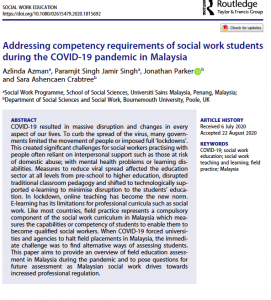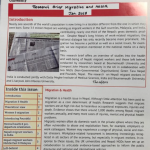Professors Sara Ashencaen Crabtree and Jonathan Parker of the Department of Social Sciences and Social Work and Centre for Seldom Heard Voices have published research that develops heir Newton/Ungku Omar research with Universiti Sains Malaysia for developing curricular and education for social workers in a time of pandemic.
COVID-19 resulted in massive disruption and changes in every
aspect of our lives. To curb the spread of the virus, many governments
limited the movement of people or imposed full ‘lockdowns’.
This created signific ant challenges for social workers practising with
ant challenges for social workers practising with
people often reliant on interpersonal support such as those at risk
of domestic abuse; with mental health problems or learning disabilities.
Measures to reduce viral spread affected the education
sector at all levels from pre-school to higher education, disrupted
traditional classroom pedagogy and shifted to technologically supported
e-learning to minimise disruption to the students’ education.
In lockdown, online teaching has become the new norm.
E-learning has its limitations for professional curricula such as social
work. Like most countries, field practice represents a compulsory
component of the social work curriculum in Malaysia which measures
the capabilities or competency of students to enable them to
become qualified social workers. When COVID-19 forced universities
and agencies to halt field placements in Malaysia, the immediate
challenge was to find alternative ways of assessing students. This paper aims to provide an overview of field education assessment in Malaysia during the pandemic and to pose questions for future assessment as Malaysian social work drives towards increased professional regulation.
 Migration & health research in Middle East & Malaysia
Migration & health research in Middle East & Malaysia










 Fourth INRC Symposium: From Clinical Applications to Neuro-Inspired Computation
Fourth INRC Symposium: From Clinical Applications to Neuro-Inspired Computation Writing policy briefs
Writing policy briefs Upholding Excellence: The Concordat to Support Research Integrity
Upholding Excellence: The Concordat to Support Research Integrity Today’s Documentation Will Serve Tomorrow’s Justice
Today’s Documentation Will Serve Tomorrow’s Justice ECR Funding Open Call: Research Culture & Community Grant – Application Deadline Friday 12 December
ECR Funding Open Call: Research Culture & Community Grant – Application Deadline Friday 12 December MSCA Postdoctoral Fellowships 2025 Call
MSCA Postdoctoral Fellowships 2025 Call ERC Advanced Grant 2025 Webinar
ERC Advanced Grant 2025 Webinar Horizon Europe Work Programme 2025 Published
Horizon Europe Work Programme 2025 Published Horizon Europe 2025 Work Programme pre-Published
Horizon Europe 2025 Work Programme pre-Published Update on UKRO services
Update on UKRO services European research project exploring use of ‘virtual twins’ to better manage metabolic associated fatty liver disease
European research project exploring use of ‘virtual twins’ to better manage metabolic associated fatty liver disease